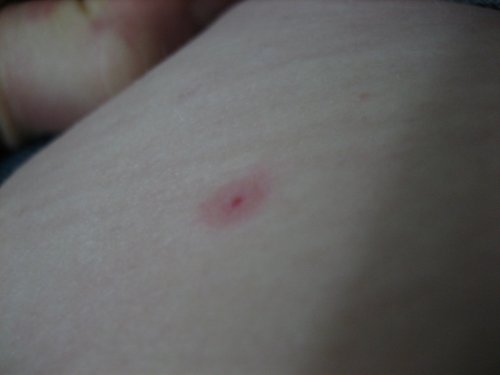Flea bites are often characterized by painful, itching red bumps that last anywhere from a few days to several weeks. During this time, the symptoms typically subside as your body’s natural defense system heals the wound. In some cases, however, infection may set into the bite, causing the symptoms to worsen over time. Whether you are suffering from a single flea bite or dozens, it’s important to follow some basic precautions to ensure it (or they) don’t become infected.
Clean The Bite Area
When you first notice a flea bite on your body, you should immediately clean the wound using either rubbing alcohol or hydrogen peroxide. Rubbing alcohol may cause some initial pain and burning, especially in cases involving larger bites — or if the bite is around a cut or some other type of wound. Cleaning the area with hydrogen peroxide, however, should eliminate any lingering bacteria and germs without triggering pain.
To clean a flea bite using hydrogen peroxide, simply pour a small amount onto a cotton ball or gauze strip and wipe the affected area. Try to avoid touching the flea bite with your fingers, as this may spread germs to the open wound.
Apply Antibiotic Ointment
After cleaning the area with rubbing alcohol or hydrogen peroxide, you should then apply a triple antibiotic ointment, such as Neosporin. This will create a barrier between your open wound and the outside world, preventing harmful bacteria and germs from entering your body. Antibiotic ointment also contains compounds that specifically target and fight off infection.
Using a Q-tip, apply a small amount of antibiotic ointment to the flea bite and cover it with an adhesive bandage. Although not always necessary, using a bandage will add level of defense against infection. Leave your flea bites open can result in the ointment being rubbed off, negating its beneficial effects. A basic bandage, however, will keep the ointment in place while also blocking out foreign invaders.
Watch The Flea Bite
In the days and weeks following your flea bite, keep an eye on the wound to ensure it’s healing properly. If the color turns into a deeper red, or if it begins to swell and cause more pain, schedule an appointment with your general practitioner. Only he or she will be able to tell you whether or not an infection is setting in.
Have you experienced an infected flea bite before? Let us know your story in the comments section below!

